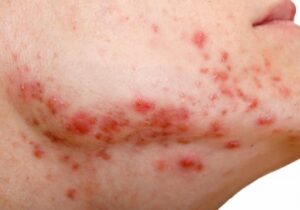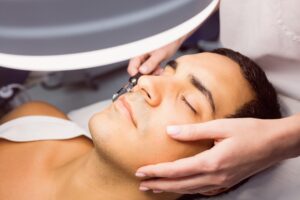The phenomenon of men having better skin than women has been a subject of scientific inquiry. This article aims to explore the underlying reasons behind this disparity by examining various factors such as hormonal influences, collagen production, sebum secretion, aging processes, sun protection practices, skincare habits and routines, and environmental influences.
By adopting an academic style characterized by objectivity and impersonality while eliminating personal pronouns, this article seeks to provide evidence-based insights into the topic at hand for a professional audience.
Key Takeaways Of Why Do Men Have Better Skin
- Testosterone regulates sebum production in men, leading to oilier skin and increased acne.
- Estrogen levels affect men’s skin, causing dryness and reduced collagen production.
- Androgen receptors play a role in how hormones interact with skin cells, influencing men’s skin characteristics.
- Men generally have higher collagen levels due to testosterone’s stimulation of collagen synthesis.
The Science Behind Men’s Skin
The scientific factors contributing to the superior quality of men’s skin are currently being investigated. One key factor is hormonal regulation, specifically testosterone. Testosterone plays a significant role in the thickness and oiliness of men’s skin. It stimulates sebum production, which helps keep the skin moisturized and protected. Additionally, testosterone promotes collagen synthesis, leading to thicker and more elastic skin. These hormonal differences contribute to men having a reduced risk of developing fine lines and wrinkles compared to women.

Another aspect that contributes to men’s better skin is their usage of skincare products designed specifically for them. In recent years, there has been an increase in the availability of skincare products tailored to men’s needs. These products often address concerns such as oily skin, acne-prone skin, and after-shave irritation. Men who incorporate these specialized products into their skincare routine may experience improved overall skin health.
Further research is needed to fully understand all the scientific factors behind men’s superior skin quality and how it can be utilized in developing effective skincare solutions for both genders.
Hormonal Factors in Men’s Skin
This discussion focuses on the hormonal factors that contribute to the differences in men’s skin.
Testosterone plays a significant role in sebum production, leading to higher levels of oiliness and acne in men compared to women.

Estrogen levels also have an impact on men’s skin, as lower estrogen levels can result in increased dryness and reduced collagen production.
Additionally, the role of androgen receptors influences how these hormones interact with the skin cells, further affecting men’s skin characteristics.
Testosterone and Sebum Production
Testosterone, a hormone predominantly found in men, has been implicated in the increased production of sebum on the skin. Sebum is an oily substance secreted by the sebaceous glands and plays a crucial role in maintaining skin hydration. However, hormonal imbalance can disrupt sebum regulation and lead to various skin conditions. Research has shown that higher levels of testosterone result in greater sebum production, which can contribute to the development of acne and oily skin. This is because testosterone stimulates the activity of sebaceous glands, leading to an excess secretion of sebum.
Understanding the effects of testosterone on sebum production is essential for developing effective skincare strategies for individuals experiencing hormonal imbalances. Moreover, it provides valuable insights into how hormones influence overall skin health and appearance beyond just gender differences.
Transitioning into the subsequent section about ‘effects of estrogen levels,’ further exploration will shed light on another significant hormonal factor affecting skin quality.
Effects of Estrogen Levels
Estrogen, a hormone primarily found in females, plays a significant role in modulating various physiological processes, including skin health and appearance. It is known to have both direct and indirect effects on the skin through binding to estrogen receptors located within the dermis and epidermis. Estrogen helps maintain the thickness and elasticity of the skin by promoting collagen synthesis and inhibiting its breakdown. Additionally, it promotes wound healing and reduces inflammation. However, hormonal imbalances can disrupt estrogen levels and lead to various skin issues such as dryness, wrinkles, and acne. Skincare products for men are specifically formulated to address these concerns by providing essential nutrients that promote healthy skin function. Moreover, these products often contain ingredients that mimic estrogen’s effects or stimulate collagen production.
| Hormonal Imbalance Effects on Skin | Skincare Products for Men |
|---|---|
| Dryness | Moisturizers |
| Wrinkles | Anti-aging creams |
| Acne | Cleansers |
| Inflammation | Serums |
| Dullness | Exfoliants |
Understanding the effects of hormonal imbalance on the skin is crucial in developing effective skincare regimens for men. However, beyond estrogen’s influence lies another key player – the role of androgen receptors in male skin health.
Role of Androgen Receptors
One crucial aspect to consider when examining male skin health is the involvement of androgen receptors. Androgen receptors, which are found in the skin cells, play a significant role in regulating various processes that impact overall skin health.
The role of androgen receptors in male skin health can be understood through the following subtopics:
- Sebum production: Androgens stimulate the sebaceous glands to produce sebum, an oily substance that helps moisturize and protect the skin.
- Hair growth: Androgens regulate hair follicle development and contribute to facial and body hair growth.
- Collagen synthesis: Androgens promote collagen synthesis, which is essential for maintaining skin elasticity and preventing signs of aging.
Understanding the impact of androgen receptors on these processes provides insights into why men tend to have better overall skin quality compared to women.
Further research on this topic may lead to novel therapeutic interventions for various dermatological conditions.
Differences in Collagen Production
This discussion will focus on the differences in collagen production between genders, the impact of collagen levels on skin aging, and the various factors that can affect collagen production.
Gender plays a significant role in determining collagen levels, with women generally having higher levels than men.
Collagen is crucial for maintaining skin elasticity and preventing signs of aging such as wrinkles and sagging.
Additionally, factors such as age, sun exposure, smoking, and certain medical conditions can influence collagen production.
Gender and Collagen Levels
Gender differences in collagen levels have been observed, with men generally exhibiting higher levels compared to women. This difference can be attributed to several factors:
- Hormonal imbalance: Testosterone, the primary male sex hormone, plays a crucial role in collagen synthesis. It stimulates the production of collagen fibers and enhances their strength. Women, on the other hand, have lower testosterone levels which may contribute to their lower collagen levels.
- Effects of aging: Collagen production naturally decreases with age for both genders. However, women experience a more rapid decline due to hormonal changes during menopause. Estrogen, which helps maintain collagen levels, decreases significantly during this period.
- Genetic predisposition: Studies suggest that genetic variations between individuals can influence collagen production and metabolism differently in men and women.
Understanding these gender differences in collagen levels is essential for developing targeted skincare treatments that address specific needs based on individual characteristics and ensure optimal skin health regardless of gender.
Impact on Skin Aging
The previous subtopic discussed the role of gender in collagen levels and how it contributes to differences in skin quality between men and women. Moving on, it is important to explore the impact of lifestyle choices and genetics on skin aging.

Lifestyle choices such as diet, smoking, sun exposure, and skincare routines can significantly affect the aging process of the skin. A healthy lifestyle with a balanced diet rich in antioxidants and vitamins can slow down skin aging by promoting collagen production and protecting against oxidative stress. Conversely, unhealthy habits like smoking and excessive sun exposure accelerate skin aging by causing inflammation, DNA damage, and breakdown of collagen fibers.
In addition to lifestyle factors, genetics also play a crucial role in determining individual variations in skin aging. Certain genetic variations can make individuals more susceptible to premature aging or provide them with inherent protection against environmental factors.
Understanding the impact of both lifestyle choices and genetics on skin aging is essential for developing effective strategies for maintaining youthful-looking skin.
| Lifestyle Choices | Impact on Skin Aging |
|---|---|
| Healthy Diet | Promotes Collagen Production |
| Smoking | Accelerates Skin Aging |
| Sun Exposure | Causes Inflammation |
| Skincare Routine | Protects Against Oxidative Stress |
Sources:
1) Rinnerthaler M., Bischof J., Streubel M.K., Trost A., Richter K. Oxidative Stress in Aging Human Skin. Biomolecules. 2015;5(2):545-589.
2) Farage MA et al. Intrinsics and extrinsic factors in skin ageing: a review Int J Cosmet Sci 2009 Jun;31(3):247-57
Factors Affecting Collagen Production
Factors affecting collagen production include lifestyle choices, such as diet and sun exposure, as well as genetic variations that can influence an individual’s susceptibility to skin aging. Collagen synthesis is crucial for maintaining the structural integrity of the skin and preventing signs of aging.
Diet plays a significant role in collagen production, with certain nutrients promoting its synthesis. Some factors influencing collagen synthesis are:
- Vitamin C: Essential for collagen formation and found in citrus fruits, strawberries, and bell peppers.
- Protein: Provides amino acids necessary for collagen production; sources include lean meats, fish, eggs, and legumes.
- Omega-3 fatty acids: Found in fatty fish like salmon or chia seeds; they reduce inflammation and promote collagen production.
Moreover, excessive sun exposure can lead to collagen breakdown through the activation of enzymes that degrade it.
Overall, a balanced diet rich in specific nutrients can positively impact collagen synthesis and contribute to healthy skin aging.
Sebum Production in Men’s Skin
Sebum production in male skin is known to be higher compared to other factors influencing skin health. Sebum, a waxy substance secreted by the sebaceous glands, plays a crucial role in lubricating and protecting the skin.
The regulation of sebum production is influenced by various factors such as hormones, genetics, and environmental factors. Studies have shown that androgen hormones, particularly testosterone, play a significant role in stimulating sebum production. Moreover, genetic variations in genes involved in sebum synthesis and metabolism can also affect sebum production levels.

Environmental factors like temperature and humidity can further influence sebum secretion. Higher levels of sebum production in male skin may contribute to differences observed in overall skin health between men and women.
Understanding the mechanisms behind sebum regulation could lead to targeted interventions for improving skin health in both genders.
Men’s Skin and Aging
Hormonal changes play a significant role in men’s skin aging. As men age, the levels of testosterone decrease, leading to various physiological changes that affect the skin. These hormonal fluctuations result in reduced collagen production and elasticity, making the skin more prone to sagging and wrinkles. Additionally, there is an increase in sebum production due to hormonal imbalances, which can contribute to acne breakouts.
To mitigate the effects of aging on their skin, men should adopt a proper skincare routine that targets specific concerns. This may include:
- Cleansing: Using a gentle cleanser twice daily helps remove impurities without stripping away natural oils.
- Moisturizing: Applying a moisturizer with ingredients like hyaluronic acid can help hydrate and plump the skin.
- Sun protection: Regularly using sunscreen with at least SPF 30 can prevent UV damage and premature aging.
Impact of Testosterone on Skin Health
Testosterone, a hormone primarily produced in the testes, has been found to have significant effects on various aspects of overall skin health. Research suggests that hormonal imbalance, particularly variations in testosterone levels, can contribute to the development and exacerbation of acne.
Testosterone stimulates the sebaceous glands in the skin to produce more sebum, an oily substance that can clog pores and lead to acne formation. Higher levels of testosterone are often associated with increased sebum production and a higher incidence of acne.
Additionally, testosterone can influence other factors related to skin health, such as collagen synthesis and wound healing. Understanding the impact of testosterone on skin health is crucial for developing effective treatments for conditions like acne and promoting overall skin well-being.
Further research is needed to fully elucidate the mechanisms through which testosterone affects skin health and how hormonal imbalances may be managed for optimal dermatological outcomes.
Sun Protection and Men’s Skin
Ultraviolet (UV) radiation from the sun poses a significant risk to the health of the skin, and therefore, effective sun protection measures are crucial for maintaining skin well-being. Men’s skincare routines should prioritize the use of sunscreen due to its importance in protecting against harmful UV rays. Here are three key reasons why sunscreen is essential:
- Shields against sunburn: Applying sunscreen with a high SPF helps prevent sunburn by blocking UVB rays from penetrating the skin.
- Reduces risk of skin cancer: Sunscreen also plays a vital role in minimizing the risk of developing skin cancer, as prolonged exposure to UV radiation increases this risk significantly.
- Fights premature aging: Regular use of sunscreen helps prevent premature aging signs such as wrinkles, fine lines, and age spots caused by long-term sun exposure.
Incorporating sunscreen into a daily skincare routine is an evidence-based practice that promotes healthy and youthful-looking skin.
Men’s Skincare Habits and Routines
When it comes to skincare habits and routines, it is important to consider the various factors that can influence an individual’s approach to maintaining skin health.
Men’s skincare products and grooming habits play a crucial role in achieving optimal skin condition. Men tend to have different needs and preferences when it comes to their skincare routine compared to women. They often prefer simpler and more straightforward products that are easy to use and provide quick results.
Additionally, men’s grooming habits such as shaving can have a significant impact on their skin. Regular shaving may lead to irritation, dryness, or ingrown hairs, which require specific products targeted towards soothing and hydrating the skin.
Therefore, understanding men’s unique skincare needs and providing appropriate products tailored for them is essential for promoting healthy skin among men.
Environmental Factors and Men’s Skin
This discussion will focus on the effects of pollution, sun exposure, and aging on the skin.
Pollution is a significant environmental factor that can have detrimental effects on the skin, leading to premature aging, increased sensitivity, and inflammation.
Sun exposure is another crucial factor that contributes to skin damage, including wrinkles, age spots, and an increased risk of skin cancer.
Pollution Effects on Skin
Air pollution has been shown to have detrimental effects on the skin, including increased oxidative stress and inflammation. The impact of air pollution on the skin is significant and can contribute to various skin concerns.
Firstly, air pollution can clog pores and lead to acne breakouts. Fine particulate matter in the air can settle on the skin surface, causing irritation and inflammation.
Secondly, exposure to pollutants like polycyclic aromatic hydrocarbons (PAHs) can induce oxidative stress in the skin cells. This leads to accelerated aging signs such as wrinkles, fine lines, and uneven skin tone.
Thirdly, air pollution can disrupt the skin’s natural barrier function by compromising its lipid layer. This makes the skin more vulnerable to external irritants and allergens.
To protect against these harmful effects of air pollution, skincare products specifically designed for pollution protection have gained popularity. These products often contain antioxidants that neutralize free radicals caused by pollution, as well as ingredients that strengthen the skin barrier.
Regular use of such products can help mitigate the negative impact of air pollution on the skin.
Sun Exposure and Aging
The effects of UV radiation on the skin have been extensively studied, and it is well-established that sun exposure can lead to premature aging. Sunscreen usage is crucial in protecting the skin from the harmful effects of UV radiation. It has been shown that regular application of sunscreen with a high SPF can significantly reduce the risk of photoaging, including wrinkles, fine lines, and age spots. UV radiation causes damage to collagen fibers in the skin, leading to loss of elasticity and firmness. Moreover, it promotes the production of free radicals which further contribute to skin aging. Therefore, consistent use of sunscreen is essential for maintaining youthful-looking skin and preventing premature aging caused by sun exposure.
Transitioning into addressing common skin concerns in men: Understanding how sun exposure affects the skin highlights one aspect of skincare that both men and women should prioritize. However, there are other specific concerns that men often face when it comes to their skin.
Addressing Common Skin Concerns in Men
Addressing common skin concerns in men involves understanding the specific factors that contribute to their better skin.
While hormonal imbalance can affect both men and women, it is a key factor that can lead to differences in skin condition. Men generally have higher testosterone levels, which promotes thicker and more collagen-rich skin compared to women. This contributes to their ability to maintain a youthful appearance for longer periods.
Additionally, skincare products specifically formulated for men’s unique needs can play a significant role in improving their skin health. These products often contain ingredients such as salicylic acid and tea tree oil, which target common issues like acne and excessive oil production. Regular use of these specialized skincare products can help address concerns related to oily skin, acne breakouts, and rough texture in men.
- Hormonal imbalance: Higher testosterone levels contribute to better skin thickness.
- Skincare products for men: Formulated with ingredients like salicylic acid and tea tree oil.
- Targeted benefits: Addressing oily skin, acne breakouts, and rough texture.
Frequently Asked Questions
How Does Men’s Skin Differ From Women’s Skin in Terms of Collagen Production?
The collagen production in men’s skin differs from women’s, potentially contributing to differences in aging. Men tend to have higher levels of collagen and thicker skin, which may provide some protection against the effects of sun exposure.
What Are the Main Hormonal Factors That Contribute to Men Having Better Skin?
Hormonal imbalances play a crucial role in skin aging. Men generally have higher levels of testosterone, which promotes collagen synthesis and sebum production. These factors contribute to their better skin quality compared to women.
Do Men’s Skincare Habits and Routines Play a Significant Role in Maintaining Better Skin?
The significance of men’s skincare habits and routines in maintaining better skin can be observed through the utilization of men’s skincare products, which offer various benefits such as improved hydration, exfoliation, and protection against environmental factors.
How Does Testosterone Impact Men’s Skin Health?
Testosterone, a hormone primarily found in males, has been shown to impact skin health. It plays a role in regulating sebum production, which can influence the development of acne. Additionally, testosterone contributes to maintaining skin elasticity.
Are There Any Specific Environmental Factors That Affect Men’s Skin Differently Than Women’s Skin?
Environmental factors play a significant role in influencing the differences observed in men’s and women’s skin. These factors include exposure to ultraviolet radiation, air pollution, and lifestyle choices, which can impact the skin microbiome and overall skin health.
Conclusion
In conclusion, the science behind men’s superior skin lies in hormonal factors, collagen production, sebum production, sun protection habits, skincare routines, and environmental influences.
Men possess increased levels of testosterone which contributes to their thicker epidermis and higher collagen density.
Moreover, men produce more sebum resulting in better moisture retention and a reduced likelihood of dryness.
Additionally, men’s diligent use of sunscreen safeguards against harmful UV radiation.
Lastly, adopting effective skincare practices tailored to address specific concerns is crucial for maintaining optimal skin health.





